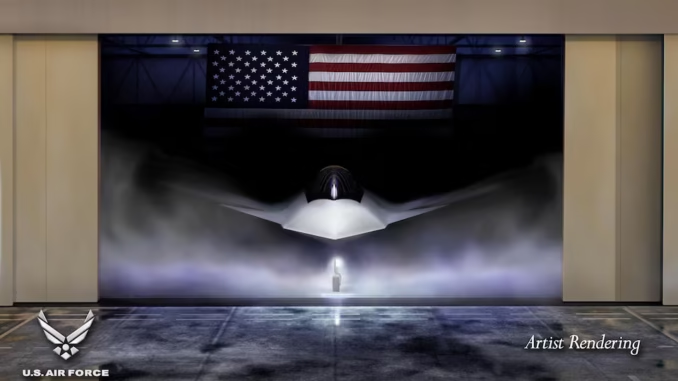
U.S. President Donald Trump awarded Boeing on Friday the contract to build the U.S. Air Force’s most sophisticated fighter jet yet, handing the company a much-needed win and boosting its shares.
The Next Generation Air Dominance program will replace Lockheed Martin’s F-22 Raptor with a crewed aircraft built to enter combat alongside drones.
The 47th president, who announced the award at the White House with Defense Secretary Pete Hegseth and Air Force leadership, said with a grin that the new fighter would be named the F-47.
Gen. David Allvin, chief of staff of the Air Force, said, “We’re going to write the next generation of modern aerial warfare with this.” And Hegseth said the future fleet “sends a very clear, direct message to our allies that we’re not going anywhere.”
Critics have questioned the cost and the necessity of the program as the Pentagon is still struggling to fully produce its current most advanced jet, the F-35, which is expected to cost taxpayers more than $1.7 trillion over its lifespan. In addition, the Pentagon’s future stealth bomber, the B-21 Raider, will have many of the same cutting edge technologies in advanced materials, AI, propulsion and stealth.
President Trump said the Pentagon secretly flew the F-47 sixth-gen aircraft for five years.
“We’ve given an order for a lot. We can’t tell you the price,” Trump told reporters in the Oval Office.
“Our allies are calling constantly,” Trump added, saying foreign sales could be an option. “They want to buy them also.”
For Boeing, the win marks a reversal of fortune for a company that has struggled on both the commercial and defense sides of its business. It is a major boost for its St. Louis, Missouri, fighter jet production business.
The loss is another blow to Lockheed after it was eliminated from the competition to build the Navy’s next-generation carrier-based stealth fighter, and amid growing discontent from the Pentagon over delays in upgrading its F-35 fighter jet.
In recent weeks, Trump met with Lockheed CEO Jim Taiclet to discuss the F-35, according to three sources.
The engineering and manufacturing development contract is worth more than $20 billion. Boeing’s win means it will make the jet fighter and receive orders worth hundreds of billions of dollars over the contract’s multi-decade lifetime.
“We recognize the importance of designing, building and delivering a 6th-generation fighter capability for the United States Air Force,” Steve Parker, who leads Boeing’s defense business, said in a statement. “In preparation for this mission, we made the most significant investment in the history of our defense business.”
The plane’s design remains a closely held secret, but would likely include stealth, advanced sensors, and cutting-edge engines.
Item 1 of 3 An artist render of the F-47 fighter, after U.S. President Donald Trump awarded Boeing the contract to build the U.S. Air Force jet, in this handout realeased March 21, 2025. U.S. Air Force graphic/Handout via REUTERS
“Compared to the F-22, the F-47 will cost less and be more adaptable to future threats – and we will have more of the F-47s in our inventory,” said Chief of Staff of the Air Force, General David Allvin.
NGAD was conceived as a “family of systems” centered around a sixth-generation fighter to counter adversaries such as China and Russia.
Allvin said the F-47 will have significantly longer range, more advanced stealth, and will be more easily supported than the F-22.
Boeing’s commercial operations have struggled as it attempts to get its best-selling 737 MAX jet production back up to full speed, while its defense operation has been weighed down by underperforming contracts for mid-air refueling tankers, drones and training jets.
“The win is a major boost for the company, which has struggled with cost overruns, schedule delays and execution on other Department of Defense programs,” said Roman Schweizer, an analyst at TD Cowen.
Cost overruns at the KC-46 mid-air refueling tanker program have surpassed $7 billion in recent years, while another fixed-price contract to upgrade two Air Force One planes has created a $2-billion loss for the top-5 U.S. defense contractor.
Boeing’s unit that makes passenger jets has faced intense scrutiny since a series of crises including a mid-air emergency in January 2024 involving a new Alaska Airlines 737 MAX 9 missing four key bolts. In January, Boeing reported an $11.8 billion annual loss – its largest since 2020 – due to problems at its major units, along with fallout from a strike that shuttered production of most of its jets.
“While disappointed with this outcome, we are confident we delivered a competitive solution,” Lockheed said in a statement. “We will await further discussions with the U.S. Air Force.”
While Lockheed could still protest the government’s award to Boeing, the fact Trump announced the deal in a high-profile press conference could reduce the possibility of a public airing of arguments against the agreement from the Bethesda, Maryland-based defense firm.
Boeing’s award drew congratulations from Democratic Senator Mark Kelly but he warned: “A program of this size and complexity requires careful oversight to make sure it doesn’t fall behind or have cost overruns.”
Billionaire and presidential adviser Elon Musk has voiced skepticism about the effectiveness of crewed high-end fighters, saying cheaper drones were a better option.
© 2025, GDC. © GDC and www.globaldefensecorp.com. Unauthorized use and/or duplication of this material without express and written permission from this site’s author and/or owner is strictly prohibited. Excerpts and links may be used, provided that full and clear credit is given to www.globaldefensecorp.com with appropriate and specific direction to the original content.





